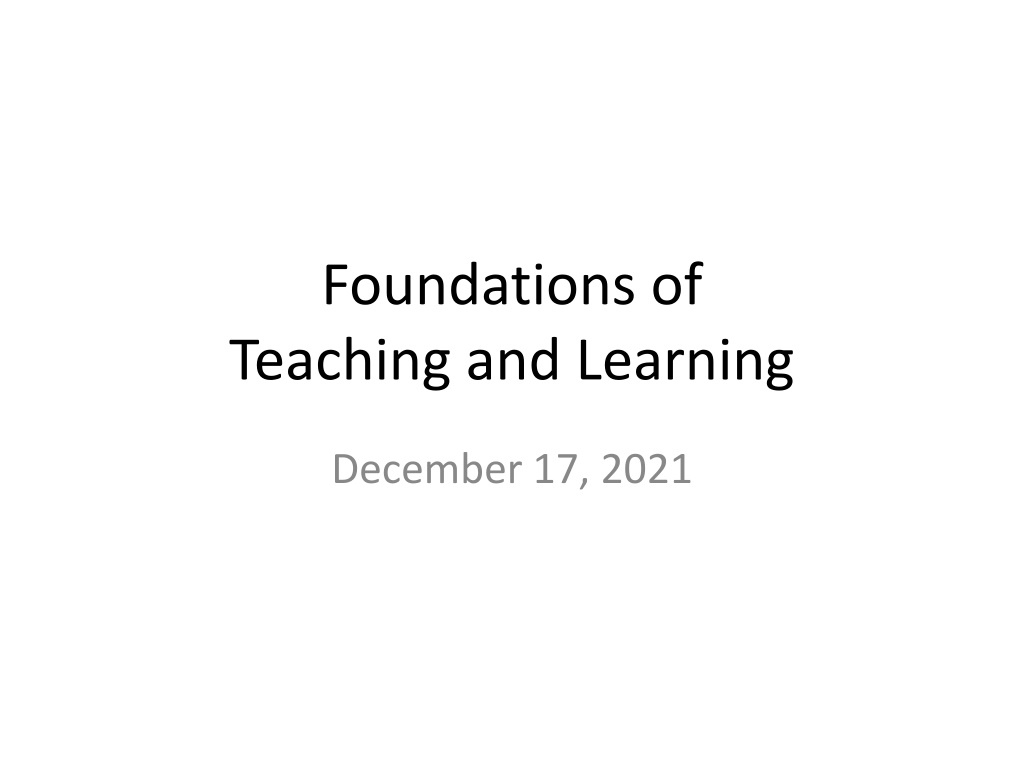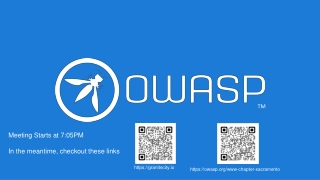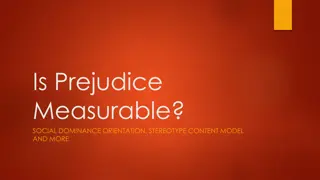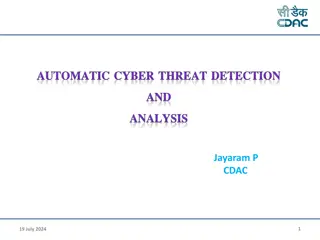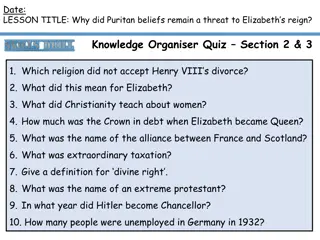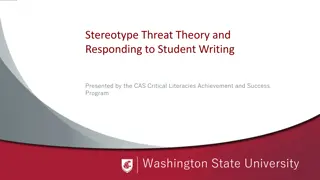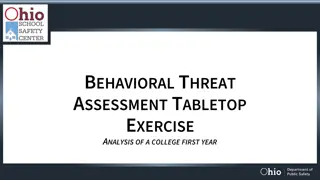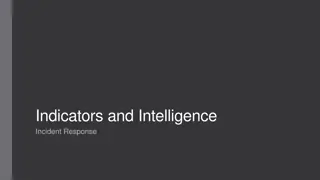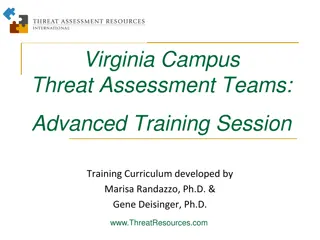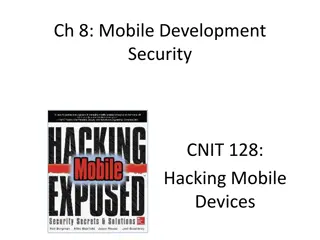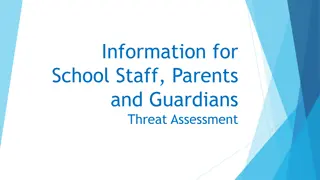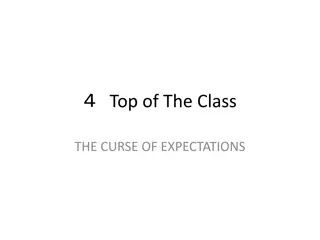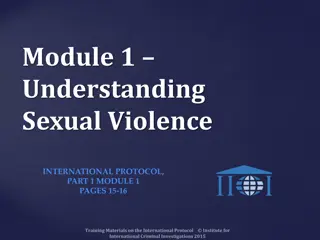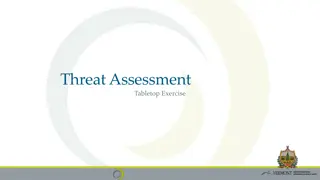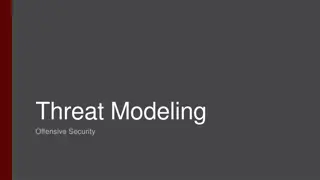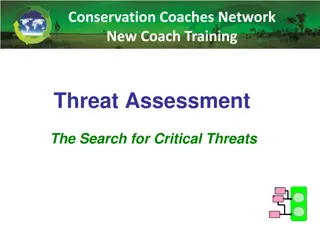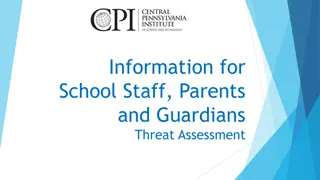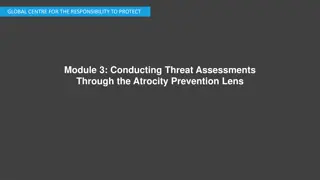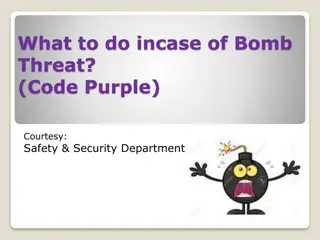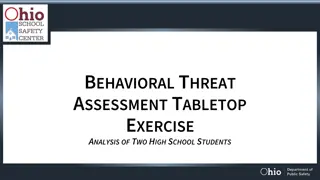Understanding Stereotype Threat in Education
Stereotype threat is a phenomenon where individuals from marginalized groups experience anxiety due to negative stereotypes about their abilities. This can impact their performance and self-perception. Various groups, such as African-Americans, Latinos, females in STEM, elderly individuals, Roma, and immigrants, have been documented to be affected by stereotype threat. Recognizing and addressing stereotype threat is crucial in creating an inclusive and supportive learning environment.
Download Presentation

Please find below an Image/Link to download the presentation.
The content on the website is provided AS IS for your information and personal use only. It may not be sold, licensed, or shared on other websites without obtaining consent from the author. Download presentation by click this link. If you encounter any issues during the download, it is possible that the publisher has removed the file from their server.
E N D
Presentation Transcript
Foundations of Teaching and Learning December 17, 2021
Final assignment Any questions?
Stereotype Threat A person belongs to a group for which society at large has a negative stereotype Standardized and simplified conception of groups based on some prior assumptions Wikipedia Stereotype Threat: The existence of such a stereotype means that anything one does or any of one's features that conform to it make the stereotype more plausible as a self- characterization in the eyes of others, and perhaps even in one's own eyes. (Steele & Aronson, 1995)
Stereotype Threat Every group is vulnerable to stereotype threat, to at least some degree Although stereotype threat can be rather comical for privileged/powerful groups
For instance My dream of being an NBA star may have been crushed by stereotype threat
For instance My dream of being an NBA star may have been crushed by stereotype threat
For instance My dream of being an NBA star may have been crushed by stereotype threat Or alternatively by the fact that I m 5 8
Groups Affected Documented for African-Americans in the USA (Steele & Aronson, 1995) Latinos in the USA (Aronson & Salinas, 1999) Females in STEM classes worldwide (Flore & Wicherts, 2015) Elderly on cognitive tests (Barber et al., 2015) Roma in Slovakia (Slobodnikova, 2017) Immigrants in Europe (Appel et al., 2015)
Groups Affected These groups face negative stereotypes about their group s intelligence or ability in a subject In the light of these stereotypes, many students experience anxiety About whether they will be judged and treated stereotypically And even about their own intelligence in the light of these stereotypes (Steele, 1990) Person affected does not need to believe the stereotype, just that other people believe it
Conceptualization of Situation Matters Effect on IQ sub-tests reduced if the test is presented as a test of eye-hand coordination (Katz et al., 1965) Effect reduced on IQ tests if student told they will only be compared to other members of their own group (Katz et al., 1964) Students perform worse on GRE items if told these items measure intelligence, than if told these items are given purely to study psychological factors (Steele & Aronson, 1995)
Obama Effect Will highly publicized success of member of same group reduce stereotype threat? By concretely challenging stereotypes
(Marx, Ko, & Friedman, 2009) At four points in time Early in presidential campaign Right after Obama accepted presidential nomination with speech at Democratic National Convention Middle of campaign Right after Obama won presidency
Procedure Adults nationwide recruited over internet European-American and African-American Given test of verbal problem-solving ability Then asked about concerns about performance and stereotypes Example: I worry that if I perform poorly on this test, others will attribute my poor performance to my race
Interventions: Initial Mixed Results Self-theory interventions reduced stereotype threat effects for female students but not for Latino or Black students (Good, Aronson, & Inzlicht, 2003) Obama effect reminder intervention did not reduce stereotype threat effects for Black students (Aronson et al., 2009) Teaching students about stereotype threat reduced its effects on female students (Johns et al., 2005)
Different Types of Stereotype Threat? Shapiro & Neuberg (2007) argue that there are two types of stereotype threat Group-as-target stereotype threats: concerns that a stereotype-relevant performance will reflect poorly on the abilities of one's group Self-as-target stereotype threats: concerns that a stereotype-relevant performance will reflect poorly on one's own abilities.
Differentiated Interventions Role model interventions effective at reducing group-as-target stereotype threat Reading an article about successful member of same group before experiment Self-affirmation interventions effective at reducing self-as-target stereotype threat Writing an essay about personal most important value and an example of how they embodied it Effective for both female and Black students
More general findings Meta-analysis (Liu, Liu, & Wang, 2021) Found that interventions around beliefs and identity generally more effective than interventions around overall resilience or grit Across groups/categories
Anxiety State anxiety Trait anxiety Math anxiety, science anxiety, language anxiety
Anxiety Generally associated with worse performance across a lot of studies Hembree (1988) reviewed 562 studies on test anxiety Effects peak in middle school, then diminish as students get older (von der Embse et al., 2018)
Anxiety Can lead students to not trust their correct answers See, for instance, Andres et al. (2021), which found that anxious students were more likely to delete correct answers (in online learning)
How does anxiety work? Anxiety and stereotype threat both occupy working memory (Maloney et al., 2013) Effectively creating extraneous cognitive load and reducing performance
Executive Function/Control The management, regulation, and control of cognitive processes
Executive Function/Control The management, regulation, and control of cognitive processes Can be impaired by pre-occupying thoughts or stressors (as discussed in Mullainathan & Shafir reading)
Categories of Executive Function (Ackerman & Friedman-Krauss, 2017)
Who here can would be willing to share an example Failure in your own attentional control What was the situation What did you do What was the outcome
Who here can would be willing to share an example Failure in your own inhibitory control (beyond attention) What was the situation What did you do What was the outcome
Who here can would be willing to share an example Failure in your own ability to show cognitive/mental flexibility What was the situation What did you do What was the outcome
We talked two weeks ago About the difficulty of training executive function through brain games
But executive function is malleable early in life Poverty strong predictor of poorer executive function (Raver et al., 2013; Allee-Hernon & Roberts, 2019), even into adulthood (Evans et al., 2021), in part due to household chaos and parental stress Teacher stress also predicts poorer executive function in children (Neuenschwander & Friedman-Krauss, 2017) Less-structured time supports development of executive function (Doebel et al., 2021) Childhood use of electric babysitter (aka television) associated with poorer long-term executive function (Lillard & Peterson, 2011)
Final Activity We have covered a lot this semester A lot of thinkers A lot of empirical work Please go into breakout groups, look back through the course syllabus, and discuss What are some things you learned in this class this semester that will probably be useful to you going forward? When we return, everyone should post one thing to the chat that they learned and think is useful
Thank you all for a great semester I learned a lot from all of you thank you
Upcoming Tasks 12/20: Final Paper due 12/21: Celebrate at home 12/22-: Please please flatten the curve
